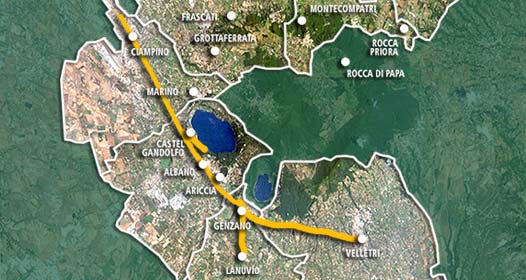|

Coming from Rome, along the Via Appia (S.S.7), after
Frattocchie, at the crossroads with the S.S. 140, at Due
Santi, turn on the left, towards Castel Gandolfo. This
panoramic road leads directly to the centre of the pleasant
town, chosen 400 years ago from the papacy as summer resort.
On Piazza della Libertà, the main square of Castel
Gandolfo, it is possible to see one of the masterpieces
of the architect Gian Lorenzo Bernini, the Church
of San Tommaso da Villanova. Leave Castel
Gandolfo by crossing the Galleria
di Sopra or the Galleria
di Sotto, two roads leading to Albano Laziale,
and let's fascinate by the numerous churches of this town:
the early Christian churches of San
Pancrazio (Albano's cathedral), of
Santa Maria della
Rotonda, and of San
Pietro; the church of San Francesco (17th
century); the Church of Santa
Maria della Stella and its wonderful catacombs;
the church of San
Paolo (18th century) and its square. Leaving
Albano and following via Appia's path you will cross the
beautiful square
of Ariccia, another Bernini's masterpiece,
the Church
of Santa Maria dell'Assunta, built by the
same artist as well as the Sanctuary
of Galloro. In Genzano visit the Church
of Santa Maria della Cima, the Santissima
Trinità Church and the Annunziata
Church. Cross Corso Don Minzoni at the centre
of the Town, till the crossroads with via S. Silvestri,
and follow the road signs towards Lanuvio. In Lanuvio
visit the medieval Assunta
Collegiate Church, and the Sanctury
of the Madonna delle Grazie.
Leaving Lanuvio, cross again the Via Appia, towards Velletri.
A route among the religious buildings of this town can
begin with a visit to the Church of Santa
Maria del Trivio, marked by its high belfry.
Reach the square in front of the Town Hall, piazza Cesare
Ottaviano Augusto, where it is possible to see the wonderful
palace of the Town Hall, the small temple of Santa
Maria del Sangue, built by artists of the
Bramante's school, and the Church
of San Michele Arcangelo in front of it.
While visiting the centre of the town do not forget to
see the Church
of Sant'Antonio, once seat of the religious
confraternity of the Mulattieri. The last but the most
important church to visit is the Cathredal,
a very old building, restored in the 17th century. It
preserves rare works such as: the Tabernacle “cosmatesco”,
the choir in wood (16th century) and a cinerary (1st century
A.C). The Church is linked to the Diocesan Museum through
the Coro d'Inverno. In this Musuem there are several works
very important from an artistic and historical point of
view. The works are divided in three sectors: paintings,
goldsmith's art, and vestments
|

